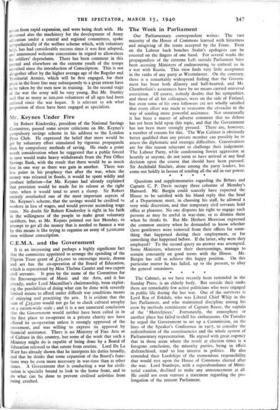Mr. Keynes Under Fire
Sir Robert Kindersley, president of the National Savings Committee, passed some severe criticisms on Mr. Keynes's compulsory savings scheme in his address to the London Press Club. lie expressed the belief that more would be got by voluntary effort stimulated by vigorous propaganda than by compulsory methods of saving. He made a point worth consideration when he suggested that a public forced to save would make heavy withdrawals from the Post Office Savings Bank, with the result that there would be as much loss in one way as there was gain in another. There was less point in his prophecy that after the war, when the money was released in floods, it would be spent wildly and produce inflation—for Mr. Keynes had already explained that provision would be made for its release at the right time, when it would tend to avert a slump. Sir Robert entirely overlooked one of the most important aspects of Mr. Keynes's scheme, that the savings would be credited to workers in lieu of wages, and would prevent ascending wage rates. No doubt Sir Robert Kindersley is right in his faith in the willingness of the people to make great voluntary sacrifices, but, as Mr. Keynes pointed out last Monday, to attempt to get all the money that is needed to finance a war by this means is like trying to organise an army of 5,000,000 men without conscription.






















































 Previous page
Previous page